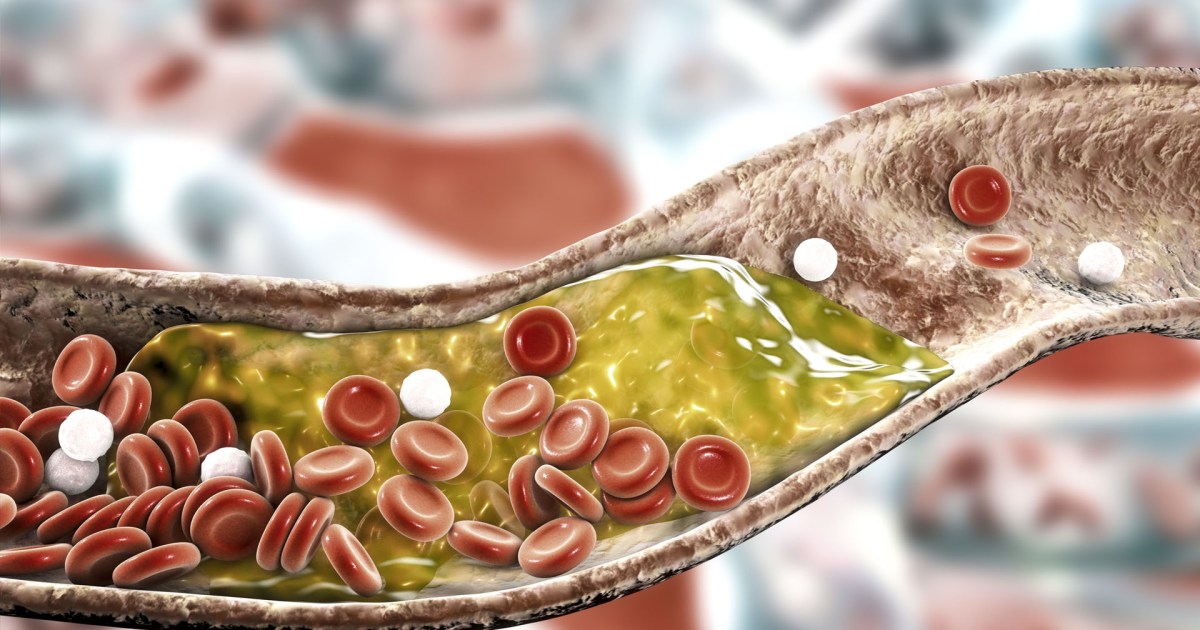High blood cholesterol is a serious problem associated with an increased risk of cardiovascular disease, so how can you lower it at home without medication within 90 days?
The answer is in this report.
We start by confirming here that the information we will provide is not a substitute for consulting a doctor, and you should follow your medication that you take if you have been diagnosed with high cholesterol and do not stop it without consulting a doctor.
On the other hand, following health advice will help control your cholesterol level, and may reduce the dose of medication that you need to treat, but always consult your doctor.
According to the UK National Health Service (NHS), it is important to keep cholesterol within a normal level, as high levels of cholesterol increase the risk of heart disease and stroke.
According to a report by Healthline, it may take 3 to 6 months to reduce bad cholesterol levels, says Dr. Nika Goldberg, medical director of the Joan H. Tisch Center for Women's Health at New York University's Langone Medical Center. LDL is achieved through diet and exercise alone, indicating that it takes women longer to see changes than men.
According to Dr. Eugenia Giannus, a cardiologist at New York University's Langone Medical Center, in a statement to the previous source, cholesterol levels can be reduced by up to 20% through dietary and lifestyle changes and limits, but this can vary depending on the person.
"We give patients 3 months to see the effects that occur with dietary changes," she says.
Susan Steinbaum, a cardiologist at Lenox Hill Hospital in New York City, said in a statement to WebMD, about lowering cholesterol, "When we adopt lifestyle changes, everything starts to transform. The improvement appears in 6 weeks and improves with 3 months."
Cholesterol is a waxy fatty substance found in your body and transmitted through the bloodstream.
Your body needs a certain amount to function properly, but it is producing everything it needs.
Cholesterol travels through the body in lipoproteins, which are soluble proteins that transport fats throughout the body.
Types of cholesterol
Low-density lipoprotein, or "bad cholesterol," (LDL), which carries cholesterol to body tissues and blood vessels.
If your body has a lot of LDL, the excess will be deposited along the walls of your blood vessels, which puts you at risk of heart attack and stroke.
HDL / High-density lipoprotein, also known as "the good cholesterol".
Excess cholesterol is taken from tissues and blood vessels to the liver, where it is removed from the body.
High-density lipoprotein helps protect you from heart disease.
So unlike low-density lipoprotein cholesterol, the higher your HDL levels, the better.
Triglyceride
Triglycerides are another type of fat that can build up in your body.
A high level of triglycerides combined with a low level of good cholesterol increases the risk of heart disease and diabetes.
What are normal cholesterol levels?
Total cholesterol in the blood, it is recommended to have a level of less than 200 mg / dL.
Good cholesterol, more than 40 mg / dL, and preferably 60 mg / dL or higher, is recommended.
The bad cholesterol level is less than 100 mg / dL.
Triglycerides, lower than 150 mg / dL recommended.
How to reduce cholesterol without drugs?
First, reduce saturated fats
According to the UK's National Health Service (NHS), eating a healthy diet and getting regular exercise can help lower your cholesterol level.
And NHS adds that eating a lot of foods rich in saturated fats can raise the level of cholesterol in the blood.
Foods high in saturated fats include:
1- Butter, ghee and animal fat.
2- Sausages.
3- Fatty cuts of meat.
4- Cream and cream.
5- Hard cheese.
6- Cakes and biscuits.
7- Foods that contain coconut or palm oil.
Conversely, eating foods that contain unsaturated fats, rather than saturated fats, can help reduce cholesterol levels.
The "NHS" recommends replacing foods that contain saturated fats and eating small amounts of foods high in unsaturated fats, such as:
1- Oily fish such as mackerel and salmon.
2- Nuts such as almonds and cashews.
3- Seeds like sunflower seeds and pumpkin seeds.
4- Avocado.
5- Healthy oils such as olive oil and corn oil.
She also recommends reducing the total amount of fats in your diet, which can also help reduce the risk of heart disease.
Instead of frying, use grilling, steaming and boiling.
Choose lean cuts of meat, choose low-fat dairy products and spreads, or eat fewer full-fat varieties.
Second: Eat more dietary fiber
Eating more fiber helps reduce the risk of heart disease, and some high-fiber foods can help lower your cholesterol.
And adults should eat at least 30 grams of fiber a day.
Your diet should include a mix of fiber sources, which include:
1- Wholemeal, bran and wholegrain bread.
2- Fruits and vegetables.
3- Potatoes with their skin.
4- Oats and barley.
5- Pulses, such as beans, peas and lentils.
6- Nuts and seeds.
It is advised to eat at least 5 portions of different fruits and vegetables daily.
Third: stay away from trans fats
Trans fats are sometimes listed on food labels as "partially hydrogenated vegetable oil," and are often used in margarine, baked goods, crackers and cakes available for purchase in stores, according to Mayo Clinic's website.
Trans fats raise total cholesterol levels.
Fourth: Be active
An active lifestyle can help lower your cholesterol.
Activities can range from walking and cycling to more vigorous exercises like running.
Getting 150 minutes of moderate aerobic exercise each week can improve your cholesterol levels.
Moderate aerobic activity means that you exercise hard enough to raise your heart rate and sweat.

